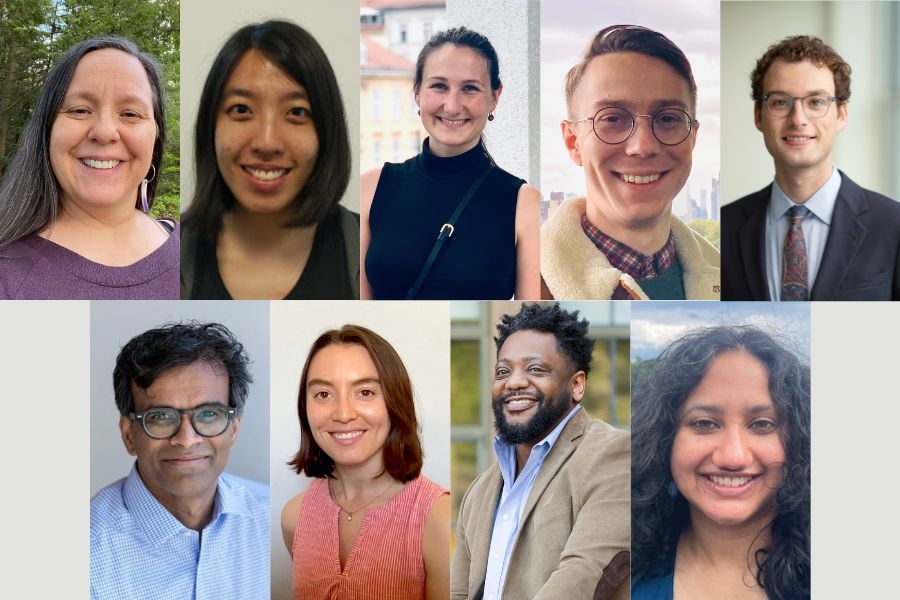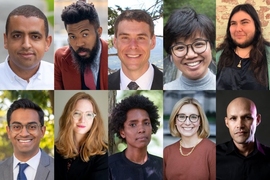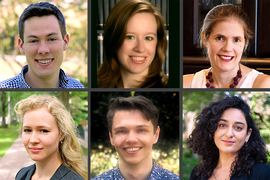Dean Agustín Rayo and the School of Humanities, Arts, and Social Sciences recently welcomed nine new professors to the MIT community. They arrive with diverse backgrounds and vast knowledge in their areas of research.
Sonya Atalay joins the Anthropology Section as a professor. She is a public anthropologist and archaeologist who studies Indigenous science protocols, practices, and research methods carried out with and for Indigenous communities. Atalay is the director and principal investigator of the Center for Braiding Indigenous Knowledges and Science, a newly established National Science Foundation Science and Technology Center. She has expertise in the Native American Graves Protection and Repatriation Act (NAGPRA) and served two terms on the National NAGPRA Review Committee, first appointed by the Bush administration and then for a second term by the Obama administration. Atalay has produced a series of research-based comics in partnership with Native nations about repatriation of Native American ancestral remains, return of sacred objects and objects of cultural patrimony under NAGPRA law. Atalay earned her PhD in anthropology from the University of California at Berkeley (UC Berkeley).
Anna Huang SM ’08 joins the departments of Electrical Engineering and Computer Science (EECS) and Music and Theater Arts as assistant professor. She will help develop graduate programming focused on music technology. Previously, she spent eight years with Magenta at Google Brain and DeepMind, spearheading efforts in generative modeling, reinforcement learning, and human-computer interaction to support human-AI partnerships in music-making. She is the creator of Music Transformer and Coconet (which powered the Bach Google Doodle). She was a judge and organizer for the AI Song Contest. Anna holds a Canada CIFAR AI Chair at Mila, a BM in music composition, a BS in computer science from the University of Southern California, an MS from the MIT Media Lab, and a PhD from Harvard University.
Elena Kempf joins the History Section as an assistant professor. She is an historian of modern Europe with special interests in international law and modern Germany in its global context. Her current book project is a legal, political, and cultural history of weapons prohibitions in modern international law from the 1860s to the present. Before joining MIT, Kempf was a postdoc at the Miller Institute for Global Challenges and the Law at UC Berkeley and a lecturer at the Department of History at Stanford University. Elena earned her PhD in history from UC Berkeley.
Matthias Michel joins the Department of Linguistics and Philosophy as an assistant professor. Matthias completed his PhD in philosophy in 2019 at Sorbonne Université. Before coming to MIT, he was a Bersoff Faculty Fellow in the Department of Philosophy at New York University. His research is at the intersection between philosophy and cognitive science, and focuses on philosophical issues related to the scientific study of consciousness. His current work addresses questions such as how to distinguish entities with minds from those without, which animals are sentient, and which mental functions can be performed unconsciously.
Jacob Moscona PhD ’21 is a new assistant professor in the Department of Economics. His research explores broad questions in economic development, with a focus on the role of innovation, the environment, and political economy. One stream of his research investigates the forces that drive the rate and direction of technological progress, as well as how new technologies shape global productivity differences and adaptation to major threats like climate change. Another stream of his research studies the political economy of economic development, with a focus on how variation in social organization and institutions affects patterns of conflict and cooperation. Prior to joining MIT, he was a Prize Fellow in Economics, History, and Politics at Harvard University. He received his BA from Harvard in 2016 and PhD from MIT in 2021. Outside of MIT, Jacob enjoys playing and performing music.
Sendhil Mullainathan joins the departments of EECS and Economics as the Peter de Florez Professor. His research uses machine learning to understand complex problems in human behavior, social policy, and medicine. Previously, Mullainathan spent five years at MIT before joining the faculty at Harvard in 2004, and then the University of Chicago in 2018. He received his BA in computer science, mathematics, and economics from Cornell University and his PhD from Harvard.
Elise Newman PhD ’21 is a new assistant professor in the Department of Linguistics and Philosophy. Her forthcoming monograph, “When arguments merge,” studies the ingredients that languages use to construct verb phrases, and examines how those ingredients interact with other linguistic processes such as question formation. By studying these interactions, she forms a hypothesis about how different languages’ verb phrases can be distinct from each other, and what they must have in common, providing insight into this aspect of the human language faculty. In addition to the structural properties of language, Newman also has expertise in semantics (the study of meaning) and first language acquisition. She returns to MIT after a postdoc at the University of Edinburgh, after completing her PhD in linguistics at MIT in 2021.
Oliver Rollins joins the Program in Science, Technology, and Society as an assistant professor. He is a qualitative sociologist who explores the sociological dimensions of neuroscientific knowledge and technologies. His work primarily illustrates the way race, racialized discourses, and systemic practices of social difference impact and are shaped by the development and use of neuroscience. His book, “Conviction: The Making and Unmaking of The Violent Brain” (Stanford University Press, 2021), traces the evolution of neuroimaging research on antisocial behavior, stressing the limits of this controversial brain model when dealing with aspects of social inequality. Rollins’s second book project will grapple with the legacies of scientific racism in and through the mind and brain sciences, elucidating how the haunting presence of race endures through modern neuroscientific theories, data, and technologies. Rollins recently received an NSF CAREER Award to investigate the intersections between social justice and science. Through this project, he aims to examine the sociopolitical vulnerabilities, policy possibilities, and anti-racist promises for contemporary (neuro)science. Rollins received his PhD in sociology from the University of California at San Francisco. Before joining MIT, he held faculty positions at the University of Washington and the University of Louisville and was a postdoc in the University of Pennsylvania’s Program on Race, Science, and Society.
Ishani Saraf joins the Program in Science, Technology, and Society as an assistant professor. She is a sociocultural anthropologist. Her research studies the transformation and trade of discarded machines in translocal spaces in India and the Indian Ocean, where she focuses on questions of postcolonial capitalism, urban belonging, material practices, situated bodies of knowledge, and environmental governance. She received her PhD from the University of California at Davis, and prior to joining MIT, she was a postdoc and lecturer at the University of Virginia.








